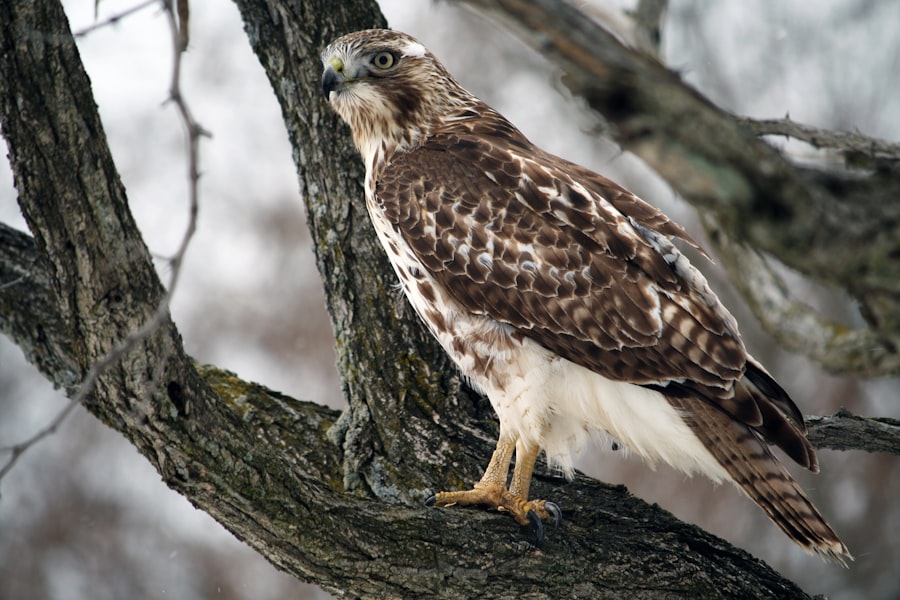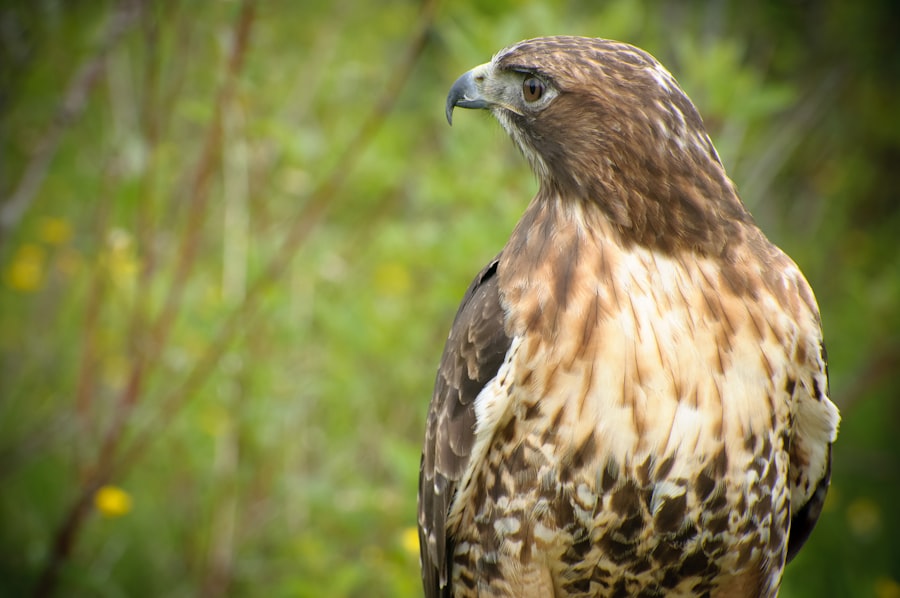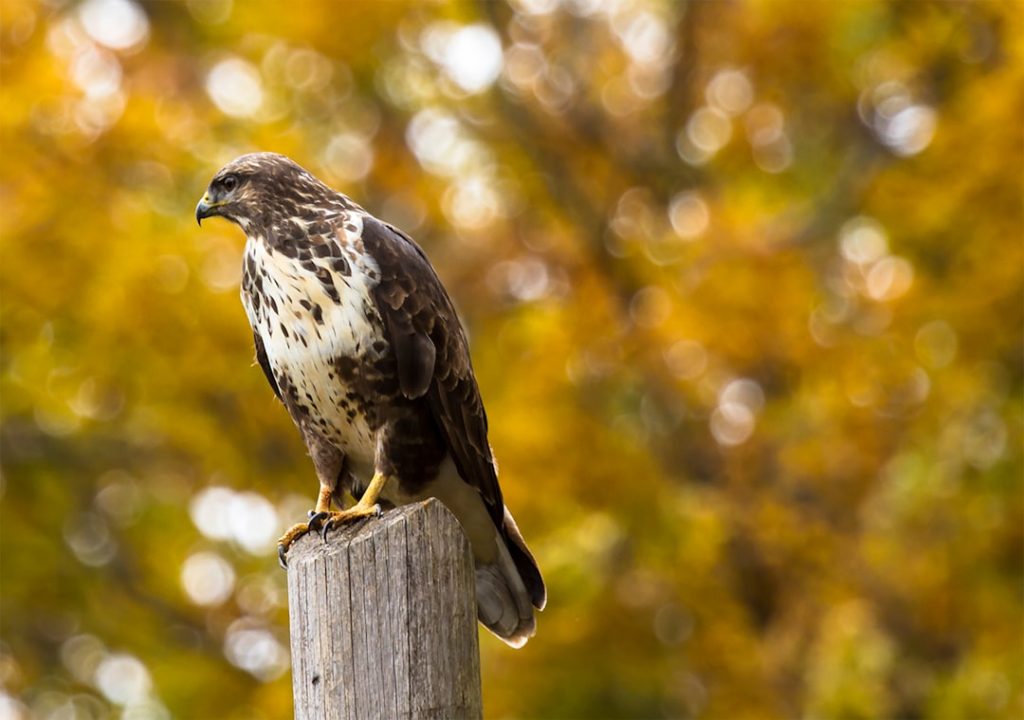Hawks are diurnal raptors renowned for their exceptional vision and efficient hunting skills. These birds of prey primarily target small mammals, birds, and reptiles as their food sources. Hawks are opportunistic predators, often selecting vulnerable prey such as domestic poultry.
They hunt during daylight hours, utilizing their sharp talons to capture and dispatch their quarry. Hawks exhibit strong territorial behavior, frequently defending their nesting sites and hunting territories from other raptors. Typically, hawks hunt individually or in pairs.
They employ various hunting strategies, including soaring at high altitudes to locate potential prey or perching on elevated positions to survey their surroundings. Hawks are known for their stealthy approach, swiftly descending upon their targets with remarkable speed and accuracy. Comprehending hawk behavior is essential for safeguarding chickens from potential attacks.
By recognizing their hunting patterns and territorial tendencies, poultry keepers can implement effective measures to discourage hawks from targeting their flocks.
Table of Contents
Key Takeaways
- Hawks are opportunistic predators and are attracted to easy prey, such as chickens.
- Protecting chickens from hawk attacks can be achieved through various methods, such as using netting or building a covered chicken run.
- Shooting hawks is illegal in many areas and may require special permits or licenses.
- Alternatives to shooting hawks include using scare tactics, such as decoys or noise makers, to deter them from the area.
- Seeking professional help, such as hiring a wildlife expert or installing predator-proof fencing, can be effective in deterring hawks from attacking chickens.
Protecting Your Chickens from Hawk Attacks
Providing Adequate Cover and Shelter
One of the most effective ways to protect your chickens from hawks is to provide them with adequate cover and shelter. This can be achieved by creating a covered run or using netting to create a protective barrier over the chicken coop.
Visual Deterrents
Another effective way to protect your chickens from hawk attacks is to use visual deterrents such as scarecrows, reflective tape, or predator decoys. These visual deterrents can help to disrupt the hunting patterns of hawks and make them think twice before targeting your chickens.
Sound Deterrents and Combination Strategies
Additionally, you can also use sound deterrents such as wind chimes or predator calls to create a hostile environment for hawks. By using a combination of visual and sound deterrents, you can effectively deter hawks from targeting your flock.
Legal Considerations for Shooting Hawks

Shooting hawks as a means of protecting your chickens is a controversial and legally complex issue. In the United States, hawks are protected under the Migratory Bird Treaty Act, which makes it illegal to harm, harass, or kill hawks without a permit. This means that shooting hawks without proper authorization can result in severe legal consequences, including hefty fines and even imprisonment.
It is important to understand the legal implications of shooting hawks before taking any action. If you believe that shooting a hawk is necessary to protect your chickens, it is crucial to obtain the proper permits and permissions from the relevant authorities. This may involve contacting your state wildlife agency or the U.S.
Fish and Wildlife Service to obtain a depredation permit. These permits are typically granted in cases where hawks pose a significant threat to livestock or property. However, it is important to note that obtaining a depredation permit can be a lengthy and challenging process, and it may not always be granted.
Alternatives to Shooting Hawks
While shooting hawks may seem like a quick and effective solution to protect your chickens, there are several alternative methods that can be equally effective without resorting to lethal measures. One alternative to shooting hawks is to use non-lethal deterrents such as predator-proof fencing, netting, or electric fencing. These physical barriers can effectively prevent hawks from accessing your chicken coop and provide a long-term solution to protect your flock.
Another alternative to shooting hawks is to use natural deterrents such as companion planting or habitat modification. By planting dense shrubs or trees around your chicken coop, you can create a natural barrier that can deter hawks from targeting your chickens. Additionally, you can also use motion-activated sprinklers or lights to startle hawks and discourage them from approaching your property.
These non-lethal alternatives can effectively protect your chickens without causing harm to wildlife.
Seeking Professional Help for Hawk Deterrence
If you are struggling to protect your chickens from hawk attacks, it may be beneficial to seek professional help from wildlife experts or pest control professionals. These professionals have the knowledge and experience to assess the situation and provide effective solutions for deterring hawks without resorting to lethal measures. They can offer valuable insights and recommendations for protecting your chickens while respecting wildlife laws and regulations.
Wildlife experts can also provide guidance on creating a habitat that is less attractive to hawks, such as removing potential food sources or nesting sites. Additionally, they can offer advice on implementing non-lethal deterrents and behavioral modifications that can effectively deter hawks from targeting your chickens. By seeking professional help, you can ensure that you are taking the most ethical and effective approach to protecting your flock from hawk attacks.
Creating a Hawk-Proof Chicken Coop

Providing Adequate Cover and Shelter
One of the most important aspects of a hawk-proof chicken coop is providing adequate cover and shelter for your chickens. This can be achieved by using netting or wire mesh to create a covered run that provides protection from aerial predators such as hawks.
Securing the Perimeter
Additionally, you can also use predator-proof fencing around the perimeter of the coop to prevent ground-based predators from accessing your chickens.
Deterrents for Hawks
Another important aspect of creating a hawk-proof chicken coop is using visual deterrents such as scarecrows or reflective tape to disrupt the hunting patterns of hawks. These visual deterrents can help to make your property less attractive to hawks and reduce the risk of potential attacks. Additionally, you can also use sound deterrents such as wind chimes or predator calls to create a hostile environment for hawks and discourage them from targeting your flock.
Finding a Balance between Protecting Chickens and Respecting Wildlife
In conclusion, protecting your chickens from hawk attacks requires a comprehensive approach that takes into account the behavior of hawks, legal considerations, and ethical alternatives to shooting hawks. By understanding the behavior of hawks and implementing effective deterrents, you can effectively protect your flock without resorting to lethal measures. It is important to seek professional help if you are struggling to deter hawks from targeting your chickens, as wildlife experts can provide valuable guidance and recommendations for protecting your flock while respecting wildlife laws and regulations.
Creating a hawk-proof chicken coop is essential for providing a safe and secure environment for your chickens. By using physical barriers, visual deterrents, and sound deterrents, you can effectively minimize the risk of hawk attacks and ensure the safety of your flock. Ultimately, finding a balance between protecting your chickens and respecting wildlife is crucial in creating a harmonious coexistence between domestic animals and native predators.
By taking proactive measures and seeking ethical solutions, you can effectively protect your chickens while respecting the natural behaviors of hawks in their native habitat.
If you are dealing with a hawk attacking your chickens, it’s important to take steps to protect your flock. One helpful resource is an article on Poultry Wizard about how to insulate a chicken coop (source). Proper insulation can help keep your chickens safe from predators like hawks, and it’s just one of the many ways you can care for your poultry.
FAQs
What is the best way to protect chickens from hawk attacks?
To protect chickens from hawk attacks, it is important to provide them with a secure and enclosed coop or run. Additionally, using netting or wire mesh over the top of the coop can help prevent hawks from swooping down and attacking the chickens.
Is it legal to shoot a hawk to protect chickens?
In the United States, hawks are protected under the Migratory Bird Treaty Act, and it is illegal to shoot them without a permit. It is important to contact local wildlife authorities or a licensed pest control professional for guidance on dealing with hawk attacks.
What are some non-lethal methods to deter hawks from attacking chickens?
Non-lethal methods to deter hawks from attacking chickens include using scare tactics such as hanging shiny objects or installing motion-activated devices that emit sounds or lights. Providing hiding spots and cover for the chickens within their enclosure can also help reduce the risk of hawk attacks.
Why do hawks attack chickens?
Hawks are natural predators and may see chickens as potential prey. They are attracted to the movement and vulnerability of chickens, making them a target for attacks. It is important to understand the behavior of hawks and take measures to protect chickens from potential attacks.
Meet Walter, the feathered-friend fanatic of Florida! Nestled in the sunshine state, Walter struts through life with his feathered companions, clucking his way to happiness. With a coop that’s fancier than a five-star hotel, he’s the Don Juan of the chicken world. When he’s not teaching his hens to do the cha-cha, you’ll find him in a heated debate with his prized rooster, Sir Clucks-a-Lot. Walter’s poultry passion is no yolk; he’s the sunny-side-up guy you never knew you needed in your flock of friends!







